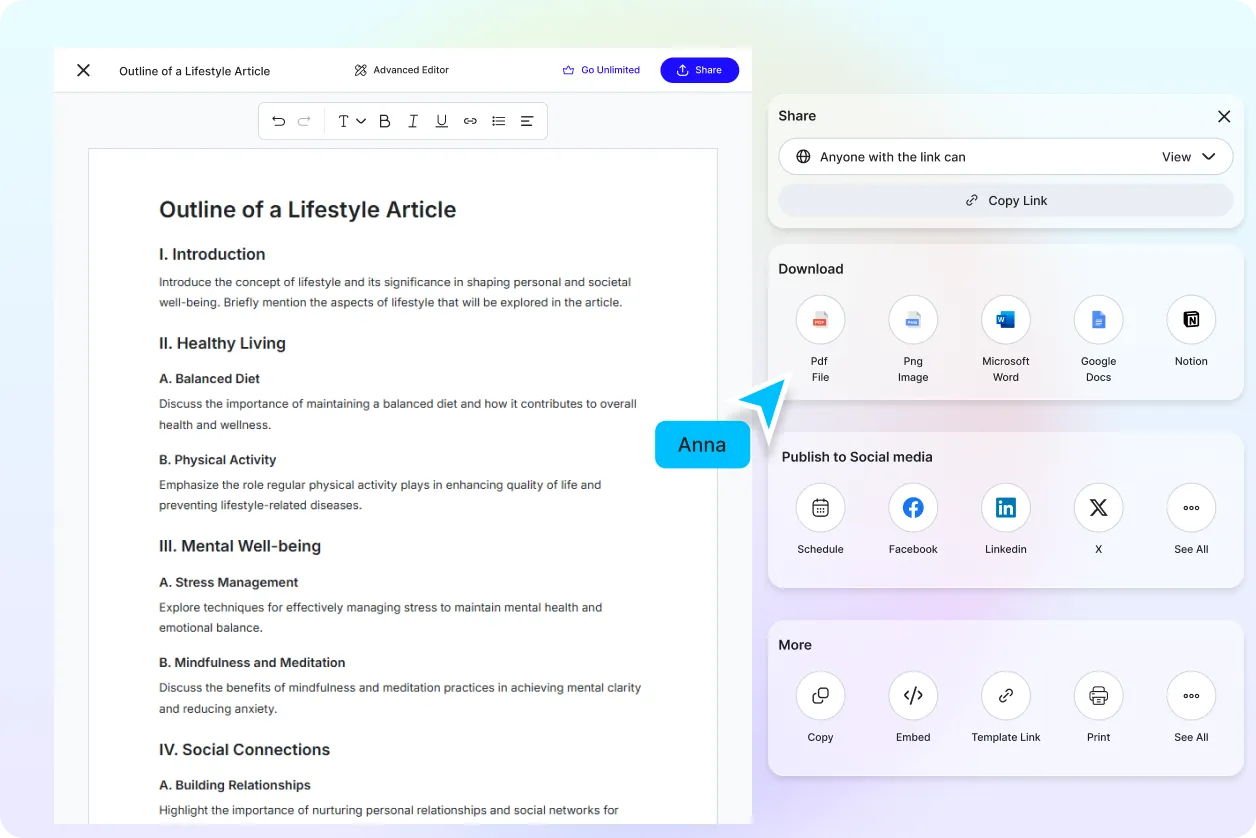Free AI Outline Generator
Enter text or voice and our AI instantly creates structured, logical outlines for any writing task. Build clear frameworks for essays, blogs, research papers, reports, presentations, and long documents. No sign up needed. Free, fast, and online.
Make Clear, Structured Outlines Online with AI Powered Outlines Generator
Template.net’s Free AI Outline Generator helps you create well organized outlines that form the foundation of high quality writing. Simply describe your topic, purpose, or audience and the AI generates a logical outline instantly. Refine headings, adjust structure, reorder sections, add notes, collaborate with others, and export your outline into multiple document formats. Ideal for students, writers, professionals, educators, and content teams working on structured writing projects.

Generate Structured Writing Outlines for Free
Everything you need to plan, organize, and structure documents clearly without manual formatting or complex writing tools.
AI Powered Outline Generator
Enter a prompt or use voice input and the AI generates a clear, topic focused outline with headings and subpoints aligned to your writing goal.
Logical Section Structuring
Automatically organize ideas into introductions, main points, subtopics, and conclusions for improved clarity and flow.
Outline Types for Any Document
Create outlines for essays, articles, research papers, reports, case studies, proposals, speeches, books, and academic assignments.
Multilingual Support
Generate structured outlines in multiple languages including English, Spanish, Hindi, French, German, Portuguese, Arabic, and more for global writing needs.
Easy Editing with Writing Tools
Edit outline headings and subpoints directly. Add notes, rewrite sections, reorder topics, adjust hierarchy, and refine wording effortlessly.
Organize Outlines into Documents
Compile outlines into structured documents for planning, drafting, or collaboration without switching tools.
Real Time Collaboration
Invite teammates, editors, or instructors to review outlines, add comments, and suggest changes together in real time.
Section Level Comment Control
Leave comments on specific outline sections for feedback, approvals, or revision notes during the planning stage.
Save Favorite Outlines
Bookmark important outlines for quick access and reuse across multiple writing projects.
Preview Before Exporting
Review your outline layout and structure to ensure clarity and logical flow before saving or sharing.
Save to Cloud Storage
Store outline documents securely in Google Drive or OneDrive and access them anytime from any device.
Download in Multiple Formats
Export outlines in PDF, Microsoft Word, Google Docs, Zoho Writer, Notion, WordPress, and other supported formats.
QR Code Access for Documents
Generate QR codes to open and edit outlines instantly on mobile devices or tablets.
Share Outlines for Review
Share outline documents via links or social platforms to gather feedback before drafting begins.
Send via Messaging Apps
Send outlines through WhatsApp or Messenger for quick review and collaboration.
Print Outlines Easily
Print outlines for offline writing sessions, classrooms, meetings, or workshops.
Rename Outline Files Anytime
Rename outline documents to keep writing projects organized and searchable.
Reuse Outline Structures
Save refined outline formats to reuse for future documents and writing workflows.

How to Generate Outlines Using AI
Create structured writing outlines in minutes by following these simple steps.
Step 1: Enter Your Topic or Prompt
Open the AI Outline Generator and type or speak a prompt like “Create an essay outline on renewable energy.” Click Generate to receive a structured outline instantly.
Step 2: Review and Refine the Outline
Edit section headings, adjust order, add subpoints, leave comments, and collaborate with others to strengthen structure and clarity.
Step 3: Save, Share, or Download
Preview your outline, save it to cloud storage, download it in your preferred format, print it, or share it with your team or instructors.
Create Outlines That Improve Writing Quality

Plan Writing with Clear Structure
Use AI generated outlines to organize ideas logically before writing, reducing confusion and improving overall document flow.

Adapt Outlines for Any Writing Goal
Customize outlines for academic, professional, creative, or technical writing based on purpose and audience.

Collaborate Early and Write Faster
Share outlines with collaborators at the planning stage to align ideas, reduce revisions, and speed up the writing process.

Manage Multiple Writing Projects Easily
Track outlines for different topics, drafts, and versions in shared workspaces with comments and approvals in one place.